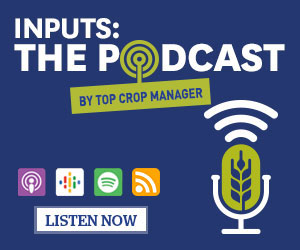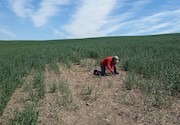| |
| |
 |
 |
| |
 |
|
@{mv_date_MMM d, yyyy}@ |
|
| |
 The German-based agriculture technology company will stop manufacturing their conventional field sprayers at the end of 2020, shifting their focus to mechanical weeders and other sustainable crop care solutions.
» Read more...
The German-based agriculture technology company will stop manufacturing their conventional field sprayers at the end of 2020, shifting their focus to mechanical weeders and other sustainable crop care solutions.
» Read more...
The U.S. maximum residue level (MRL) for chlormequat chloride, the active ingredient in Manipulator plant growth regulator, on oats now matches the Canadian MRL, allowing treated oats to be sold to both markets.
» Read more...
The Canadian Agri-Business Education Foundation (CABEF) recently announced the winners of their 2020 Pathways to Agri-Food scholarships, given to students pursuing agriculture or agri-food at a Canadian postsecondary school.
» Read more...
|
| |
 |
 |
| |
|
| |

Our final episode features Tom Wolf, a spray application specialist, co-owner of Agrimetrix Research and Training in Saskatoon, and co-creator of Sprayers 101. He provides information on spraying and spray technology, though he focused on fungicide spraying – a relatively new type of spraying with additional challenges when compared to herbicide spraying. Tom discusses the importance of timing, best fungicide spray practices, and how to get the most out of your spray days.
>> Listen Now |
| |
|
| |
 Since lindane insecticidal seed treatment was removed from the market in 2004 and no effective replacement has been developed, wireworm control challenges have increased. Haley Catton, an entomologist with Agriculture and Agri-Food Canada in Lethbridge, Alta., has worked on a project examining the impact of crop rotation on wireworm populations since 2017, with promising results.
» Learn more
Since lindane insecticidal seed treatment was removed from the market in 2004 and no effective replacement has been developed, wireworm control challenges have increased. Haley Catton, an entomologist with Agriculture and Agri-Food Canada in Lethbridge, Alta., has worked on a project examining the impact of crop rotation on wireworm populations since 2017, with promising results.
» Learn more |
| |
 Efforts to find control methods for Fusarium head blight (FHB) in wheat are happening in Eastern and Western Canada, including a project led by Christiane Catellier with the Indian Head Agricultural Research Foundation in Saskatchewan. Catellier’s study examines FHB from a multivariate approach, looking at how many variables interact to affect disease development, rather than one isolated variable.
» Learn more
Efforts to find control methods for Fusarium head blight (FHB) in wheat are happening in Eastern and Western Canada, including a project led by Christiane Catellier with the Indian Head Agricultural Research Foundation in Saskatchewan. Catellier’s study examines FHB from a multivariate approach, looking at how many variables interact to affect disease development, rather than one isolated variable.
» Learn more |
| |
 |
 |
| |
|
| |
 “Preventing clubroot from establishing on your farm is the best strategy there is, because when you start with zero spores in your field, there’s zero selection pressure against any canola hybrids that you’re growing,” Stanton says. >> Read more here about managing clubroot spore loads and resistant hybrids like Pioneer® brand 45CM39.
“Preventing clubroot from establishing on your farm is the best strategy there is, because when you start with zero spores in your field, there’s zero selection pressure against any canola hybrids that you’re growing,” Stanton says. >> Read more here about managing clubroot spore loads and resistant hybrids like Pioneer® brand 45CM39.
| |
|
| |
It can feel like farmers and consumers are speaking different languages when hot button issues are discussed. What creates this communication breakdown?
» Read more
Labour shortages and misconceptions about farm work are two factors that, in 2019, made the job-vacancy rate in agriculture the “highest of any major sector in the Canadian economy.”
» Read more
Farming is considered one of the most hazardous occupations in Canada. How can farmers better prepare for and prevent on-farm incidents?
» Read more
|
| |
| | |











